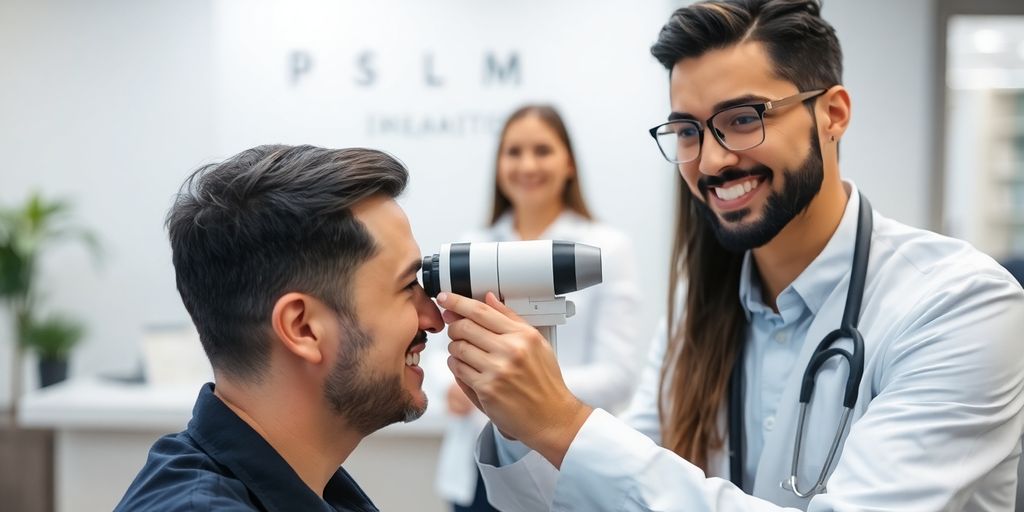Running an optometry practice is a lot. You've got patients to see, eyes to check, and a business to keep running smoothly. But all those phone calls? Missed calls can mean missed appointments and unhappy patients. That's where a virtual receptionist for optometrist can really help out. Think of it as having an extra person, always available, to handle the calls so you can focus on what's really important – your patients' vision.

Keeping your appointment book full and organized is key to a thriving optometry practice. But let's face it, managing schedules, handling cancellations, and filling last-minute openings can feel like a full-time job in itself. This is where a virtual receptionist truly shines, taking the administrative burden off your shoulders.
Imagine your calendar filling up automatically, even when your office is closed. A virtual receptionist can handle appointment booking 24/7, allowing patients to schedule visits at their convenience. They can access your real-time availability, select a time slot, and confirm their appointment, all without human intervention. This means fewer phone calls for your staff and more booked appointments for your practice. It's like having an extra scheduler working around the clock.
Missed appointments are a drain on practice resources and revenue. Virtual receptionists can send automated appointment reminders via text or email, significantly cutting down on no-shows. These reminders can be customized to include practice information, directions, or even pre-appointment instructions. Patients appreciate the heads-up, and your practice benefits from a fuller, more predictable schedule. This proactive approach helps optimize your practice's efficiency.
Life happens, and patients sometimes need to change their appointments. A virtual receptionist can manage these requests efficiently. They can process cancellations and facilitate rescheduling, often filling the newly opened slot with another patient from a waitlist if your system allows. This process keeps your schedule optimized and minimizes the administrative work for your front desk staff, allowing them to focus on patients in the office.
Keeping your patients in the loop and feeling connected is super important for any optometry practice. It's not just about the eye exam itself; it's about the whole experience they have with your office. When people feel like they're being heard and that you genuinely care about their vision health, they're more likely to stick around and even tell their friends. A virtual receptionist can really help with this.
Think about all those common questions that come up daily: office hours, insurance questions, or how to refill a contact lens prescription. A virtual receptionist can answer these right away. They pull information directly from your practice's records, so the answers are always correct and consistent. This means your front desk staff isn't tied up answering the same questions over and over. They can then spend their time on more involved patient needs or tasks that really need a human touch.
After an appointment, especially if a patient is trying new glasses or contact lenses, a quick follow-up can make a big difference. A virtual receptionist can send out these personalized messages, checking in on how the patient is doing. They can also share specific care instructions, like how to clean new lenses or what to expect during recovery. This kind of attention shows patients you're invested in their well-being beyond just the visit, making them feel more valued. It’s a great way to build stronger patient relationships.
Many practices now use patient portals for everything from booking appointments to accessing records. A virtual receptionist can help manage these systems smoothly. They can guide patients on how to use the portal, help them retrieve prescriptions, or even assist with scheduling through the portal. This keeps communication flowing easily between your practice and your patients, making sure everyone can access the information they need without hassle. It’s about making your practice accessible in the ways patients prefer to communicate today, like through patient portals.

Let's talk about how to make your optometry practice run like a well-oiled machine. Sometimes, the sheer amount of paperwork and daily tasks can feel overwhelming, pulling your team away from what really matters – the patients. This is where bringing in virtual support can really change the game for your administrative workflows.
Think about all those little things that eat up your staff's day. We're talking about things like confirming appointments, updating patient records, managing incoming mail, and even basic data entry. A virtual assistant can take these tasks off your team's plate. They're pros at handling the routine stuff, which means your in-office staff has more time to focus on patients who are actually there. It’s like having an extra pair of hands, but without the need for more desk space or equipment.
When administrative tasks are handled efficiently, your whole practice benefits. Virtual assistants can help organize patient files, verify insurance information before appointments, and even manage your practice's inventory if needed. This kind of support helps prevent bottlenecks and keeps things moving smoothly. Imagine fewer errors in patient records or insurance claims because someone is dedicated to getting it right. This improved efficiency means your practice can see more patients and operate with less stress.
Getting patient information right from the start is super important. Virtual receptionists can help with this by managing patient intake forms, collecting necessary details before appointments, and even conducting basic pre-screening questions over the phone or via text. This not only saves time during the actual patient visit but also ensures that you have accurate information readily available for the optometrist. Some services can even help convert leads into bookings, making sure you don't miss out on potential patients. It’s about making that first impression count and setting the stage for a great patient experience from the moment they first contact your practice. You can find services that integrate with your existing systems, making the transition smooth. This AI receptionist service can handle a lot of these initial interactions.
Delegating these administrative duties frees up your skilled optometry staff to concentrate on providing direct patient care, improving both job satisfaction and the quality of service delivered.
When it comes to running an optometry practice, keeping the financial side of things in order is pretty important, right? It’s not just about seeing patients; it’s also about making sure the money flows correctly. A virtual receptionist can really help smooth out a lot of the tricky financial tasks that often bog down an office.
One of the biggest headaches for any practice is dealing with insurance. It’s complicated, and one wrong move can mean delayed payments or, worse, not getting paid at all. Virtual receptionists can take on the job of verifying patient insurance details and checking their specific vision benefits before appointments even happen. This means fewer surprises down the line and a much cleaner process for everyone involved. They can confirm coverage, understand deductibles, and note any co-pays, all before the patient walks in the door. This proactive step helps prevent billing errors and keeps your revenue cycle moving.
After the appointment, the work isn't over. Claims need to be submitted accurately and on time. Virtual receptionists can assist with preparing and submitting these claims to insurance companies. They can also help manage the billing process, ensuring that patients receive their statements promptly and accurately. If there are any issues with a claim, they can be the first point of contact to sort things out, saving your in-office staff a lot of time and hassle. This kind of support is key to maintaining a healthy cash flow.
Chasing down payments can be awkward and time-consuming. A virtual receptionist can handle the follow-up on outstanding balances with professionalism and persistence. They can make calls, send reminders, and set up payment plans, all while maintaining a positive patient relationship. This consistent effort helps to reduce the amount of money that gets tied up in unpaid accounts, directly impacting your practice's financial health. It’s about getting paid for the great work you do, without making your staff feel like debt collectors. Think of it as having a dedicated person focused on making sure your practice gets the reimbursement it deserves, which is a big part of optimizing practice finances.
Handling the financial administration, from verifying benefits to following up on payments, can be a significant drain on resources. Delegating these tasks to a virtual receptionist frees up your team and improves accuracy, ultimately benefiting your practice's bottom line.
Running an optometry practice involves a lot of moving parts, and the administrative side can really drain your budget if you're not careful. Hiring and training in-house staff for every role, especially for after-hours or peak times, adds up quickly. You've got salaries, benefits, training expenses, and even the need for more physical office space and equipment. It's a significant investment.
Think about it: a virtual receptionist can handle a huge chunk of these duties without needing a salary, benefits, or a dedicated desk in your office. It’s like having an extra team member who’s always available, but without the hefty overhead. This means you can provide better service and coverage without breaking the bank on staffing. For example, a starter plan with My AI Front Desk can cost as little as $48.75 per month when billed annually, which is a fraction of what a full-time employee would cost. Many small practices find they can cover this cost just by scheduling one extra appointment.
Beyond salaries, there are other costs associated with in-house staff. You need desks, computers, phones, and potentially even more office space to accommodate them. A virtual receptionist works remotely, eliminating these expenses entirely. You don't need to worry about providing office supplies, internet, or maintaining equipment for them. This frees up your physical space for patient care or other essential functions.
Virtual receptionist services offer a level of flexibility that traditional hiring often can't match. Whether your practice has fluctuating patient loads or you just need support during specific hours, you can scale services up or down as needed. This adaptability is perfect for budget management, allowing you to pay only for the support you actually use. It’s a smart way to manage your finances while still getting the administrative help your practice needs to run smoothly. You can access expert-level support without the long-term commitment or financial strain of hiring permanent employees.

When your in-office team is constantly bogged down with phone calls, appointment changes, and basic patient questions, it's tough for them to really focus on what matters most: the patients in front of them. That's where bringing in virtual support can make a huge difference. It's not just about offloading tasks; it's about giving your skilled staff the breathing room they need to do their best work.
Think about your front desk staff. They're often the first point of contact, juggling check-ins, answering phones, and managing the waiting room. When a virtual receptionist handles a good chunk of those incoming calls and appointment requests, your team can dedicate more undivided attention to the patients who are physically present. This means fewer interruptions during patient exams and more personalized interactions, making patients feel truly seen and cared for. It’s about shifting the focus back to direct patient care.
Every member of your practice has specific skills. A virtual assistant can take over tasks like insurance verification, updating patient records, or even initial pre-screening questions. This allows your certified technicians or optometrists to concentrate on diagnostic work and treatment planning, rather than getting sidetracked by administrative duties. It’s about letting everyone work at the top of their license, so to speak.
Constant administrative interruptions can really break a team's concentration. When routine tasks are handled by a virtual receptionist, your staff can maintain a better workflow. They're less likely to be pulled away from important tasks by a ringing phone or a new email notification. This consistent focus leads to fewer errors, improved efficiency, and a generally calmer, more productive work environment. It’s amazing how much more can get done when you’re not constantly switching gears. You can learn more about how an AI virtual receptionist can help manage these tasks by visiting [b347].
Making sure your patients feel well-cared for from the moment they think about your practice is a big deal. It's not just about the eye exam itself; it's about the whole interaction. When patients can easily get in touch, have their questions answered quickly, and feel like you remember them, they're much happier. This leads to them coming back and even telling their friends about your practice.
Think about how many times a patient calls with a simple question, like "What are your hours?" or "Do you take my insurance?" An AI receptionist can handle these routine questions instantly, using information directly from your practice's records. This means every patient gets the same correct answer, every time. It also means your in-office staff aren't tied up answering the same questions over and over. They can focus on greeting patients who are physically there or helping with more involved patient needs. It’s about making sure every interaction, whether it's a phone call or an in-person visit, feels smooth and professional.
It's the little things that make a big difference. Imagine an AI receptionist that can recall details from a patient's last visit or mention a specific concern they had. This kind of personalized touch makes patients feel noticed and genuinely cared for, not just like another number. When your practice shows it remembers and values its patients, it builds a stronger connection. This personal engagement is key to making patients feel like they're part of your practice community, not just a transaction. It’s a straightforward way to build loyalty.
People expect to be able to reach you whenever they need to, and they want answers fast. An AI front desk makes this possible by being available 24/7. Whether it's booking an appointment late at night or asking about a prescription refill during lunch, the AI is there. This constant availability means no patient inquiry gets missed, no matter the time or day. It’s like having an extra team member who never sleeps, always ready to help. This kind of responsiveness makes patients feel supported and taken care of, which really boosts their overall satisfaction with your practice. It’s a smart way to keep your practice relevant and growing in today's busy world. You can find more tips on improving patient interactions at your practice.
It's a big deal when you can get someone who actually gets what you do. Hiring a virtual receptionist or assistant who already knows the ins and outs of an optometry practice means they can jump right in. They understand terms like 'refraction' or 'pupillary distance' without needing a lengthy explanation. This kind of specialized knowledge helps them handle patient calls and administrative tasks more effectively. They know how to talk to patients about scheduling follow-up appointments, discussing contact lens orders, or even explaining basic pre-appointment instructions. It’s like having an extra team member who’s already on your wavelength, which really cuts down on training time and potential mistakes.
Your practice likely uses specific software for patient records, scheduling, and billing. A virtual receptionist familiar with these types of systems can integrate much more smoothly. They won't need extensive training on how to use your electronic health record (EHR) system or your patient portal. This familiarity means they can manage appointments, update patient information, and process requests accurately from day one. Think about how much time and frustration this saves compared to teaching someone new software from scratch. It’s about finding support that fits your existing setup, making your daily operations run more like a well-oiled machine. This kind of support can really help with managing patient portals.
Beyond just software, having virtual support that understands the typical workflow in an eye care setting is a game-changer. They know the rhythm of a practice, from handling routine check-ups to managing more complex cases. This includes understanding the importance of things like insurance verification before appointments or the process for sending out post-visit care instructions. When your virtual team member is familiar with these eye care workflows, they can anticipate needs and handle tasks proactively. This means fewer dropped balls and a more consistent, professional experience for your patients. It’s about getting help that’s not just general admin, but specifically geared towards the unique demands of optometry, which can really help streamline your practice.

Protecting patient information is a big deal, and with a virtual receptionist, you can rest easy knowing that sensitive data is handled with the utmost care. These professionals are trained to follow strict protocols, making sure everything stays secure and compliant with regulations.
When you work with a virtual receptionist service, you're getting professionals who understand the importance of HIPAA. They know how to manage patient records, appointment details, and any personal information shared, all while keeping it private and secure. This means no unauthorized access and proper handling of all data that comes through.
Your patients trust you with their health details, and that trust extends to how their information is stored and used. Virtual receptionists use secure systems and follow best practices to prevent data breaches. Think of it as having an extra layer of security for all the personal information your practice collects, from contact details to medical history. It’s about keeping everything locked down tight.
Building and keeping patient trust is key to a successful practice. By using a virtual receptionist service that prioritizes data security, you show your patients that you're serious about protecting their privacy. This professionalism in handling information helps maintain a strong reputation and encourages patients to continue choosing your practice for their eye care needs. It’s a simple way to show you care about more than just their vision; you care about their overall privacy too. If you're looking for reliable support, services like My AI Front Desk can help manage your practice's communications securely.
Sometimes, things come up unexpectedly, and patients need help right away. It’s not always about scheduling a routine check-up; it could be a sudden eye irritation, a concern about vision changes, or even a question about medication. When these urgent situations arise, having a system in place to manage them efficiently is really important for patient well-being and trust in your practice.
A virtual receptionist can act as a first line of defense for urgent calls. They are trained to listen for keywords or specific descriptions of symptoms that indicate a serious issue. Based on your practice's protocols, they can then prioritize these calls, making sure they get to the right person or department immediately. This means a patient experiencing a sudden loss of vision won't be stuck waiting in a general queue; their call will be flagged and handled with the urgency it deserves. It’s about making sure the most critical needs are addressed first, preventing delays that could impact patient outcomes.
When a patient calls with an emergency, time is often of the essence. A virtual receptionist can quickly gather necessary information – like the patient's name, contact details, and a brief description of the problem – and relay it to your clinical staff. They can also help schedule an immediate appointment or direct the patient to an emergency contact if your practice is closed. This rapid response helps to de-escalate the situation and provides the patient with a clear path forward, reducing their anxiety and ensuring they receive timely care. Think of it as having an extra pair of hands ready to manage the immediate needs so your in-office team can focus on providing direct care.
Emergencies can be stressful for patients, and how your practice handles these moments significantly impacts their perception. A virtual receptionist is trained to remain calm and professional, even when dealing with a distressed caller. They can offer reassurance while gathering information and clearly communicate the next steps. This consistent, composed approach helps to build confidence and trust, even in difficult circumstances. It shows patients that your practice is prepared and capable of managing unexpected events, which is a big part of providing excellent patient care.
When urgent patient needs arise, you need a reliable system to handle them. Our AI receptionist is always on, ready to take calls, book appointments, and answer questions, ensuring no patient is left waiting. Discover how our service can help you manage your practice more smoothly. Visit our website today to learn more!
So, bringing a virtual receptionist into your optometry practice isn't just about answering phones. It's about making your whole operation run smoother, cutting down on those annoying administrative headaches, and letting your team focus on what they do best – taking care of patients' eyes. Think about it: fewer missed appointments, happier patients getting quick answers, and your staff feeling less swamped. It really frees up everyone to do a better job, and honestly, that's good for business. It’s a smart move for any practice looking to keep up and give patients the best experience possible.
A virtual receptionist is like a helper who works remotely. They answer phones, book appointments, and handle other office tasks for your eye doctor's office, but they do it from their own location using computers and phones. This helps your office run more smoothly.
Yes, they can! Virtual receptionists are great at managing your appointment calendar. They can help patients book new appointments, change existing ones, and send out reminders so fewer people forget to show up. This means your schedule stays full and you see more patients.
They can handle many common questions, like asking about office hours, what insurance you accept, or how to get a prescription refilled. This frees up your staff to help patients who are actually in the office, making sure everyone gets the attention they need.
Virtual receptionists are usually less expensive than hiring someone to work full-time in your office. You don't have to pay for their desk space, computer, or benefits. This can save your practice a good amount of money.
Yes, absolutely! They are trained to follow rules like HIPAA, which keeps patient information private and safe. This means your patients' sensitive data is protected, and your practice stays compliant with important laws.
They can help a lot! Virtual receptionists can check if a patient's insurance will cover their visit and what their costs will be. They can also help with sending in claims for payment and following up on bills that haven't been paid yet.
When your staff isn't busy answering phones or booking appointments, they have more time to focus on patients directly. This means better eye exams, more help with glasses or contacts, and a friendlier experience for everyone who visits your practice.
They are trained specifically for healthcare offices like yours. They understand the language used in eye care and know how to use the software your practice might use. This means they can start helping effectively right away without much extra training.
Start your free trial for My AI Front Desk today, it takes minutes to setup!








